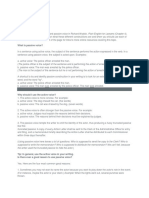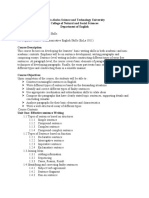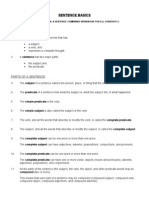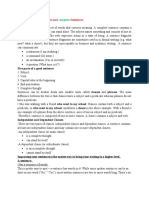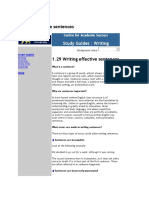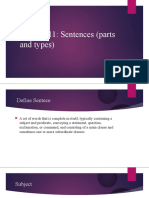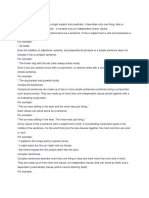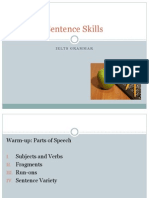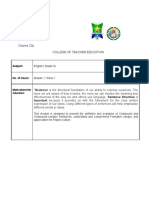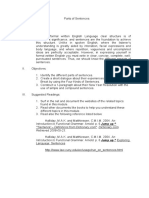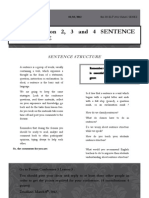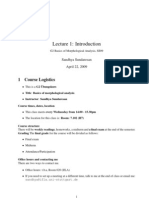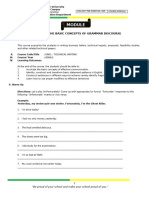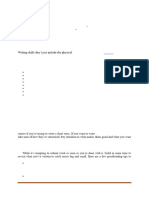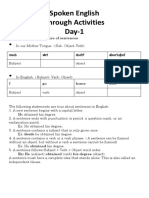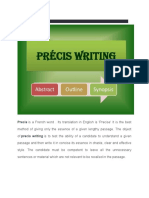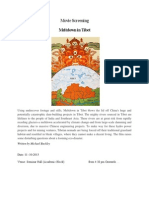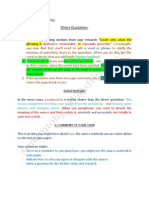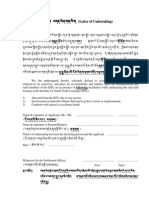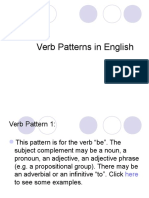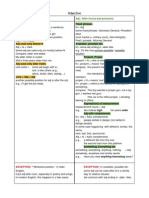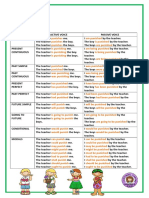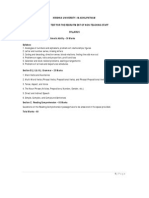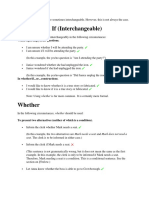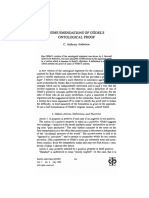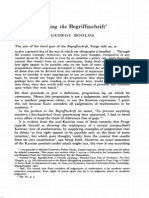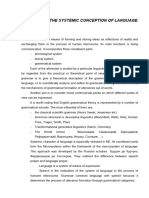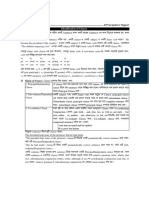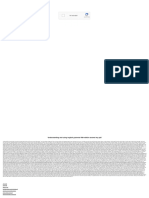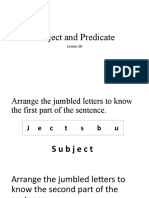What Is Writer's Block?
What Is Writer's Block?
Uploaded by
Sonam TobgyalCopyright:
Available Formats
What Is Writer's Block?
What Is Writer's Block?
Uploaded by
Sonam TobgyalOriginal Description:
Original Title
Copyright
Available Formats
Share this document
Did you find this document useful?
Is this content inappropriate?
Copyright:
Available Formats
What Is Writer's Block?
What Is Writer's Block?
Uploaded by
Sonam TobgyalCopyright:
Available Formats
Overcoming Writer's Block What is writers Block? - Its the inability to get your words down on paper.
It can occur at any time in the writing process - It usually occurs between planning and drafting, but it can occur at any time in writing process - It can last only a few moments or it can last far, far longer. - It can cause great anxiety and problems in school, especially when it comes to writing on standardized or high stakes tests. Main Reasons: for writers Block: - Lack of subject knowledge - Fear of failure - Afraid of being rejected - Afraid that you have nothing to say - Afraid of offending, success etc. Part 1: Lack of subject knowledge Problem- you dont have any ideas, or you dont know enough about the subject that youve been assigned. How to overcome: - Become an active learner - Become a reader. (Make habits) - Research Part 2: Afraid of Failing Problem: you are afraid that youre going to get poor grade or that youll look foolish in front of other people. How to solve: - Dont concentrate on what youre doing wrong; instead, concentrate on what youre doing right! - Consider your paper as a first draft, not as a final copy. Write it quickly and then go back and revise it. - Remember that everyone has the same fears. Part 3: Fear of Rejection Problem- Wiring by its very nature is an act of self-revelation. Youre afraid that youre going to reveal something about yourself and how you feel about things. If you think your writing isnt any good, then youre going to feel rejected. How to overcome: - Dont reveal your innermost thoughts. Adopt a persona or an identity that your use to write. Part 4: Afraid you have nothing to say: Problem: Youre afraid that your writing is trite or your writing is boring. Youre afraid it wont be original. How to overcome: - Prepare thoroughly. Know your stuff. - Choose unusual topic. -
Part 2: Breaking through Writers Block: Prewriting Part 1: What is a Sentence? A sentence is a group of words that: - Has a subject - Has a predicate - Expresses a complete thought. 1) The subject will be a noun or a pronoun. 2) The predicate is the verb or the verb phrase (and anything that is not part of the noun or the pronoun). Eg: Lacking the subject: - Was the oldest person elected president at age 69. (Incorrect) - Ronald Reagan Was the oldest person elected president at age 69. (Corrected) Lacking Predicate:- John F. Kennedy being the youngest person elected president at age 43. (Incorrect) - John F. Kennedy was the youngest person elected president at age 43. (Corrected) Sentence Function and form - The function of a sentence is the purpose that it fulfills. - The form of a sentence is the number and the type of clauses that it that it has. There are four functions of sentences: Declarative: A declarative sentence declares or states something. Those are sentences that state an idea and end with a period. Interrogative: sentences interrogate or ask a question, so they end with a question mark. (?) Imperative: give orders or directions, and they can end with a period or with an exclamation mark. Exclamatory: sentences exclaim, so they would end with an exclamation mark because they convey strong emotion. (!) There are two types of clauses: Dependent Independent Clauses are groups of words that contain subjects and predicates; they may or may not express a complete thought. An Independent clause can stand alone. It has a subject and a predicate and expresses a complete thought. An Independent clause is also called a sentence. Example: Aaron Burr killed Alexander Hamilton in duel. A dependent clause has a subject and a predicate but does not expresses a complete thought. A dependent clause is also called a subordinate clause.
Example: Because Aaron Burr killed Alexander Hamilton in duel. SENTENCE FORMS - A simple sentence - A compound sentence - A complex sentence - A compound-complex sentence Simple sentence has one independent clause (one subject and one verb) although either or both can be compound. - A simple sentence can have adjectives, adverbs or prepositional phrases. It CANNOT, however, have another independent clause or any subordinate clauses. Compound sentences 2 or more independent clauses joined in one of two ways is a compound sentence. You can join it: with a comma and coordinating conjunction: FANBOYS (; close relation) Complex sentences A complex sentence simply has one independent clause and at least one dependent clause. The dependent clause can go first for second - You link the dependent clause to the independent clause with a subordinating conjunction. e.g. Because, when, while, unless, since, until, after, although, as Turtles that live on land tend to have thick shells. While those that spend nearly all of their time in water usually have thinner shells. Compound-Complex sentences A compound-complex sentence is a compound sentence (two independent clauses) with some dependent clauses. You have at least two independent clauses and at least one dependent clause. These tend to be relatively long sentences! e.g. Although typical lizards have four legs ending in clawed toes, several types of lizards have reduced limbs, or they may not have limbs at all. Part 2: What Is an Effective Sentence? Effective sentences have 4 main qualities: Correct (free from errors) Clear Concise (to the point) Varied (four type of sentences) Correct Sentences: Your sentences have to be correct to communicate your meaning clearly. Correct sentences dont have any mistakes in: - Form
- Punctuation - Capitalization - Modifier placement FORM: Correct sentences are complete. They do not have any parts missing. A part missing create a fragment. - A fragment may be missing a subject or a verb, or it may not express a complete thought. - A run-on is when you take two independent clauses (two complete sentences) and you run them together without adding one of the coordinating conjunction (FANBOYS) or without adding a semicolon. - A comma splice is a run-on that uses a comma instead of the semicolon. - Fragments, run-ons, and comma splices are examples of sentence errors. - However, you are allowed to use fragments when you write dialogue in your narratives. USE CORRECT PUNTUATION AND CAPITALIZATION Every sentence has to begin with a CAPITAL letter and end with the correct end punctuation. USE CORRECT MODIFIER PLACEMENT Modifiers are describing words and phrases. To modify mean to change, and youre modifying by describing something. You decide where to place your modifiers depending on the word you wish to emphasize, but always place your modifiers as close as possible to the words that they describe. E.g. - The chef beat the dough vigorously. - The chef vigorously beat the dough. - Vigorously, the chef beat the dough. Misplaced modifiers: Misplaced modifiers describe the wrong word. - The player hit a home run with the green hat. Dangling modifiers: appear to modify nothing because there is a word missing from the sentence. - With misplaced modifiers, youre simply moving a word or a phrase - But with dangling modifiers, you have to provide the part thats missing. E.g. walking across the beach, the sand burned my feet. CONCISE SENTENCES You want to make your sentences concise by eliminating unnecessary words and phrases. Unnecessary words and phrases = redundancy E.g. Honest truth Most unique Proceed ahead Small in size What is a paragraph?
A paragraph is a group of sentences that relate to a single main idea or a central point. .. You can tell what a paragraph looks like because its typically indented about five spaces. A paragraph has 3 main parts. It has: 1. A topic sentence 2. A supporting sentence (at least one) 3. A concluding sentence Memorize this saying: tell them what youre going to tell them. Then tell them. Then tell them what you told them.
You might also like
- Basic Writing Skills HandoutDocument11 pagesBasic Writing Skills HandoutFanuel Derese100% (1)
- 84640457019Document2 pages84640457019Subhankar BiswasNo ratings yet
- Elp Group1 Lesson 4 7Document17 pagesElp Group1 Lesson 4 7Aries T. SantosNo ratings yet
- Sentence StructureDocument6 pagesSentence StructureJinli BalaticoNo ratings yet
- English For Business Success Chapter 1 (V. 1.0)Document80 pagesEnglish For Business Success Chapter 1 (V. 1.0)Yoe Putra Paddong100% (1)
- Gns 101 Week 2,3,4, Combined PDF by Harbubakar YafogiDocument34 pagesGns 101 Week 2,3,4, Combined PDF by Harbubakar YafogiayomideajeniyaNo ratings yet
- Active/Passive Voice: Grammar & StyleDocument10 pagesActive/Passive Voice: Grammar & Stylejulius AquinoNo ratings yet
- Sentence ProblemsDocument53 pagesSentence Problemsdennise100% (2)
- Chapter 1Document13 pagesChapter 1Emmanuella MonicaNo ratings yet
- General EnglishDocument17 pagesGeneral EnglishalokpandeygenxNo ratings yet
- English 201 (Sophomore English)Document44 pagesEnglish 201 (Sophomore English)Markos MathewosNo ratings yet
- Basic Writing Skill Handout 2015Document33 pagesBasic Writing Skill Handout 2015talilaNo ratings yet
- SUMSEM-2021-22 ENG2000 LO VL2021220700597 Reference Material I 08-06-2022 Sentence Types and Dangling ModifierDocument48 pagesSUMSEM-2021-22 ENG2000 LO VL2021220700597 Reference Material I 08-06-2022 Sentence Types and Dangling ModifierDeadshotNo ratings yet
- 02) SentenceDocument3 pages02) SentenceSj SjNo ratings yet
- Writing For Success - Ch02 Week 1Document56 pagesWriting For Success - Ch02 Week 1Bob100% (6)
- AVC Basic Writing Skills 2023 GCDocument77 pagesAVC Basic Writing Skills 2023 GCtofiqefiqirNo ratings yet
- Addis Ababa Science and Technology University College of Natural and Social Sciences Department of EnglishDocument8 pagesAddis Ababa Science and Technology University College of Natural and Social Sciences Department of EnglishNurye NigusNo ratings yet
- Document 16Document4 pagesDocument 16Alexis SuperioNo ratings yet
- English ReportDocument32 pagesEnglish ReportmatttttmatteNo ratings yet
- Basic Ielts WritingDocument35 pagesBasic Ielts WritingHoang AnhNo ratings yet
- Reviewing and EditingDocument7 pagesReviewing and Editingmokhtari raniaNo ratings yet
- The Sentence - An OverviewDocument53 pagesThe Sentence - An OverviewMicaela Musso ZelayaNo ratings yet
- Unit One of Basic Writing SkillsDocument22 pagesUnit One of Basic Writing SkillsHirpha Batu AlcmNo ratings yet
- 1. Sentence Writing SKillsDocument35 pages1. Sentence Writing SKillsbrinokamangatNo ratings yet
- How To Write Effective SentencesDocument8 pagesHow To Write Effective SentencesIndri WulandariNo ratings yet
- Writing Skills For EAPDocument44 pagesWriting Skills For EAPyankholundu3No ratings yet
- Group 1Document28 pagesGroup 1CLENT JAY ENERONo ratings yet
- Simple SentencesDocument5 pagesSimple SentencesJessica MarieNo ratings yet
- English Revision SR 2Document33 pagesEnglish Revision SR 2Sarah SebyNo ratings yet
- Desiring Her C.C.Document4 pagesDesiring Her C.C.Threja May MarquiñoNo ratings yet
- TestyDocument5 pagesTestyAlla HalaiNo ratings yet
- Sentence SkillsDocument43 pagesSentence Skillsjuana7724No ratings yet
- La Salle University Ozamiz City College of Teacher EducationDocument8 pagesLa Salle University Ozamiz City College of Teacher EducationRauleneNo ratings yet
- Sentence (CMS 107)Document19 pagesSentence (CMS 107)amosadjartey42No ratings yet
- Module No 1Document9 pagesModule No 1Hanelen DadaNo ratings yet
- Module 2 Structures of EnglishDocument64 pagesModule 2 Structures of EnglishFatima AbayonNo ratings yet
- Miss Nadia García: Mòdulo English 2 HomeworkDocument6 pagesMiss Nadia García: Mòdulo English 2 HomeworkMaría Cecilia ChancayNo ratings yet
- Unit 1 Lesson 2, 3 and 4 SENTENCE StructureDocument4 pagesUnit 1 Lesson 2, 3 and 4 SENTENCE StructureMelva Nadzira Barajas AguilarNo ratings yet
- A WordDocument10 pagesA WordMilica VranicNo ratings yet
- New Book GrammarDocument88 pagesNew Book GrammarManinder KaurNo ratings yet
- English Grammar Lessons: Introduction To Sentence StructureDocument26 pagesEnglish Grammar Lessons: Introduction To Sentence StructurecelesteNo ratings yet
- Writting SkillDocument58 pagesWritting Skillmohammed yimerNo ratings yet
- CivilisationDocument5 pagesCivilisationabdouaoaoaoNo ratings yet
- Module-2-Technical-WritingDocument16 pagesModule-2-Technical-WritingMecah RiveraNo ratings yet
- Technical WritingDocument27 pagesTechnical WritingRona CabahugNo ratings yet
- 01Unit1notesDocument25 pages01Unit1notesshinchanzzzz2000No ratings yet
- Unit 1Document30 pagesUnit 1ezez tadesseNo ratings yet
- Rani Hafni DR - Uts CeaDocument3 pagesRani Hafni DR - Uts Ceazuhraoktaviola30No ratings yet
- Week 4 Types of SentenceDocument7 pagesWeek 4 Types of SentenceAya MeftiNo ratings yet
- Presentación1Document16 pagesPresentación1mihaitavy14No ratings yet
- Simple Compound SentencesDocument23 pagesSimple Compound SentencesVishnu Ronaldus NarayanNo ratings yet
- Subjects Verbs Book 4Document104 pagesSubjects Verbs Book 4Muller Gabriela100% (1)
- CPE - Notes and Suggestion On How To Take The ExamDocument15 pagesCPE - Notes and Suggestion On How To Take The ExamfedeNo ratings yet
- How To Write A Band 5 Essay For FCE B2Document7 pagesHow To Write A Band 5 Essay For FCE B2ani100% (3)
- Spoken English Handout Day 1Document7 pagesSpoken English Handout Day 1Shashidhar KulkarniNo ratings yet
- Writing Effective Sentences in EssayDocument10 pagesWriting Effective Sentences in EssaydevdsantoshNo ratings yet
- Clauses and SentencesDocument4 pagesClauses and SentencesJesus MarcanoNo ratings yet
- Word Classes - Parts of Speech, Phrases, Clause, Sentence StructureDocument11 pagesWord Classes - Parts of Speech, Phrases, Clause, Sentence Structureabdullahnaughty7No ratings yet
- Precis Writing EnglishDocument13 pagesPrecis Writing EnglishVishal YadavNo ratings yet
- How to Speak and Write Correctly: Study Guide (English + Korean)From EverandHow to Speak and Write Correctly: Study Guide (English + Korean)Rating: 3 out of 5 stars3/5 (17)
- Dolma TicketDocument1 pageDolma TicketSonam TobgyalNo ratings yet
- Bep EnglishDocument15 pagesBep EnglishSonam TobgyalNo ratings yet
- Vol. 9, No. 4, 1996 Nature, Society, and ThoughtDocument129 pagesVol. 9, No. 4, 1996 Nature, Society, and ThoughtSonam TobgyalNo ratings yet
- Message Duke 1949 To 1963Document0 pagesMessage Duke 1949 To 1963Sonam TobgyalNo ratings yet
- Occasion v03 Nandy 031512Document10 pagesOccasion v03 Nandy 031512Sonam TobgyalNo ratings yet
- Tenzin Dolkar EassyDocument1 pageTenzin Dolkar EassySonam TobgyalNo ratings yet
- Movie Screendfling PDFDocument1 pageMovie Screendfling PDFSonam TobgyalNo ratings yet
- Tibetan Demography BibliographyDocument6 pagesTibetan Demography BibliographySonam TobgyalNo ratings yet
- Constructing Diaspora STDocument24 pagesConstructing Diaspora STSonam TobgyalNo ratings yet
- Indian Threat-Mongering Over Water Resource Disputes Dangerous FantasyDocument2 pagesIndian Threat-Mongering Over Water Resource Disputes Dangerous FantasySonam TobgyalNo ratings yet
- Financial Year 2013-2014Document1 pageFinancial Year 2013-2014Sonam TobgyalNo ratings yet
- Part 1Document2 pagesPart 1Sonam TobgyalNo ratings yet
- Financial Year 2013-2014Document1 pageFinancial Year 2013-2014Sonam TobgyalNo ratings yet
- Movie ScreeningDocument1 pageMovie ScreeningSonam TobgyalNo ratings yet
- Admission at Chagpori Tibetan Medical Institute, Darjeeling For Session September 2013Document1 pageAdmission at Chagpori Tibetan Medical Institute, Darjeeling For Session September 2013Sonam TobgyalNo ratings yet
- Gendun ChopelDocument5 pagesGendun ChopelSonam Tobgyal100% (1)
- Direct Quotation:: Technique For Note MakingDocument1 pageDirect Quotation:: Technique For Note MakingSonam TobgyalNo ratings yet
- The Way Forward On TibetDocument7 pagesThe Way Forward On TibetSonam TobgyalNo ratings yet
- Letter of UndertakingDocument1 pageLetter of UndertakingSonam TobgyalNo ratings yet
- NounsDocument26 pagesNounsKhongorzul EnkhbaatarNo ratings yet
- Verb PatternsDocument82 pagesVerb PatternsripihamdaniNo ratings yet
- Contoh Possessive AdjectiveDocument6 pagesContoh Possessive AdjectiveCHukup Ndra KaDhuoNo ratings yet
- Informal Assessment SCRIPTDocument5 pagesInformal Assessment SCRIPTMich N. CaneteNo ratings yet
- Grammar 1 2017 1a Aula John WhitlamDocument57 pagesGrammar 1 2017 1a Aula John WhitlamJuliana CotiniNo ratings yet
- Adjective Normal PositionDocument4 pagesAdjective Normal PositionThet NaungNo ratings yet
- The Study of WordsDocument20 pagesThe Study of WordsWen-Ti LiaoNo ratings yet
- ContinueDocument5 pagesContinueClash with SayakNo ratings yet
- Passive Voice ChartDocument1 pagePassive Voice ChartK Sofía RoncalloNo ratings yet
- Simple Past Story 3Document7 pagesSimple Past Story 3Giovana Gomez0% (1)
- Non Teaching Positions - Syllabus & Model QPDocument4 pagesNon Teaching Positions - Syllabus & Model QPIndiaresultNo ratings yet
- The Words If and WhetherDocument3 pagesThe Words If and WhetherJulian Mancipe AcuñaNo ratings yet
- Understanding French SubjunctiveDocument10 pagesUnderstanding French SubjunctiveHimara JayasekeraNo ratings yet
- Student's Name:: Unit 2 - Activity 2Document5 pagesStudent's Name:: Unit 2 - Activity 2Jhonny chavezNo ratings yet
- The NounDocument12 pagesThe NounCismaru ElenaNo ratings yet
- Anderson Anthony C 22some Emendations of Gc3b6dels Ontological Proof22Document13 pagesAnderson Anthony C 22some Emendations of Gc3b6dels Ontological Proof22Ruan DuarteNo ratings yet
- Vocabulary Enhancement Week 1-MacerenDocument2 pagesVocabulary Enhancement Week 1-Macerenjenchulichaeng blinkueNo ratings yet
- NLPDocument39 pagesNLPamreen786No ratings yet
- Boolos ReadingDocument14 pagesBoolos ReadingFernando Gastón BosyNo ratings yet
- English Langauge Booklet (Advanced) - 1-CompressedDocument274 pagesEnglish Langauge Booklet (Advanced) - 1-Compressedsufialimj17No ratings yet
- Lexical Passive and Its Serbian Equivalents1Document6 pagesLexical Passive and Its Serbian Equivalents1aleksandra_rajicNo ratings yet
- TheorgramDocument33 pagesTheorgramეფრემ ნატროშვილიNo ratings yet
- Ielts Writing ChecklistDocument4 pagesIelts Writing ChecklistNgan-Giang DangNo ratings yet
- Identification of ClausesDocument5 pagesIdentification of ClausesSaidul IslamNo ratings yet
- Understanding and Using English Grammar Fifth Edition Answer Key PDFDocument2 pagesUnderstanding and Using English Grammar Fifth Edition Answer Key PDFSokhim ProeunNo ratings yet
- Actividad Interactiva de Possesive AdjectivesDocument4 pagesActividad Interactiva de Possesive AdjectivesJhady PerezNo ratings yet
- Subject PredicateDocument17 pagesSubject PredicateRazon SiadorGe Sor-MilaNo ratings yet
- Communicative EnglishDocument64 pagesCommunicative Englishsohail bangashNo ratings yet
- Recognizing Euphemisms and Dysphemisms Using Sentiment AnalysisDocument10 pagesRecognizing Euphemisms and Dysphemisms Using Sentiment AnalysisBerlianaNo ratings yet
- 0 EvaluareDocument3 pages0 Evaluarecristea madalinaNo ratings yet






